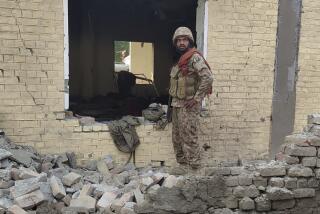Suicide bombing ring busted, Afghans say
- Share via
KABUL, AFGHANISTAN, AND ISTANBUL, TURKEY — Afghan authorities said Tuesday that they had broken up a suicide bombing cell responsible for a string of attacks in the capital, including a massive explosion last month that killed an American serviceman and wounded five other U.S. soldiers.
In a disclosure likely to stoke tensions with Pakistan, a spokesman for Afghanistan’s main intelligence service said the 17 men arrested in Kabul were believed to be affiliated with a Pakistan-based militant group known as the Haqqani network and that the cell’s ringleader was a Pakistani national.
The spokesman, Sayed Ansari, also hinted that the plotters were assisted by Pakistan’s powerful Inter-Services Intelligence directorate.
Afghanistan has long accused Pakistan of failing to crack down on insurgents who use Pakistan’s lawless tribal areas as a staging ground for attacks in Afghanistan.
Relations between the neighboring nations have warmed considerably since Pakistani President Asif Ali Zardari, the widower of slain former Prime Minister Benazir Bhutto, took office five months ago. Afghan President Hamid Karzai attended Zardari’s inauguration and hailed what he called a fresh diplomatic start.
But critics and allies alike have questioned the Zardari government’s ability to move effectively against insurgents in the tribal areas -- or to rein in the ISI, which has a long history of aiding groups such as the Taliban.
The spy agency’s long-standing ties to the Haqqani network, led by veteran Taliban commander Jalaluddin Haqqani and his son Sirajuddin, were spotlighted last year when U.S. intelligence backed up Afghan authorities’ assertion that the ISI had aided the group in its bombing of the Indian Embassy in Kabul in July. The attack killed nearly 60 people.
Pakistan heatedly denied any ISI involvement in the embassy attack. The Foreign Ministry had no immediate comment on the latest allegations from Kabul, said deputy spokesman Nadeem Hotiana.
Ansari, the spokesman for Afghanistan’s National Directorate of Security, told reporters that the bombing cell that was broken up had carried out half a dozen attacks in the Afghan capital during the last 22 months.
He said the suspects had confessed to all of the bombings, including a Jan. 17 attack that targeted the German Embassy but also took place close to an American military base. In addition to the U.S. soldier killed and five servicemen injured in that attack, four Afghan passersby were killed and more than a dozen were hurt. No one inside the embassy was killed, but an undisclosed number of people were injured, German officials said.
The Afghan spokesman did not say when the arrests occurred, only that they were the result of raids at three places in Kabul. Three of the bombing ring’s organizers remained at large and were believed to be in Pakistan, he said.
Ansari’s suggestion of ISI support for the Haqqani network was unmistakable but less specific than past Afghan allegations against the Pakistani spy agency. When asked about a possible ISI role in arming and training the Kabul ring, he replied: “Who arms Haqqani and organizes [him], and where has he established his bases?”
U.S. military and intelligence officials have said the Haqqani network is based in Pakistan’s North Waziristan tribal agency.
Ansari said the Kabul plotters also were believed to have links to a Pakistani militant group known as Harkat Mujahedin, which originally fought Indian troops in the disputed Himalayan region of Kashmir but has more recently affiliated itself with the Taliban. Harkat Mujahedin, like other militant fundamentalist groups in Kashmir, was believed to have been nurtured by the ISI.
--
More to Read
Sign up for Essential California
The most important California stories and recommendations in your inbox every morning.
You may occasionally receive promotional content from the Los Angeles Times.










